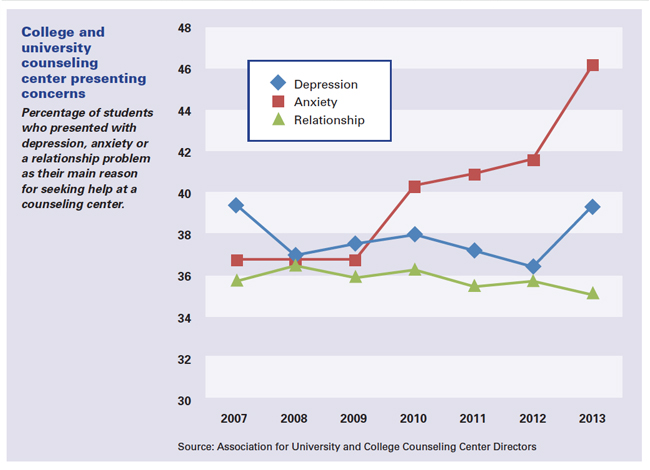"I get hot, my heart races, I feel like I can’t breathe (or I breathe too fast), nausea, I feel like there is this pent up energy inside me and it will not go away - often I will shake my legs to try and relieve it, but that rarely helps."
- Anonymous (Senior)
What Increases Anxiety?
Although anxiety differs from each individual and can be triggered from different things, certain events,
history, relations, and more affect each student.
Grades
Current Year
(fresh.Soph.Jun.Sen.)
Heredity
Major
Expectations
Presentations
New people/environment
Employment
Uncertainity
"What can Help?"
- Breathing
"At its worst [anxiety] sweating, feeling like I can't breathe, shaking, crying, can't focus on literally anything."- Anonymous (Senior)
- Speaking up
"Reading about others and realizing that I'm not alone with my anxiety."- Anonymous (Senior)
- Keeping Busy
"Breathing exercises and keeping a busy schedule has helped my anxiety."Anonymous (freshman)
- Sleep
"Absolutely. There are days (or weeks or semesters) when it is just so bad that I can tell my grades are being affected because I'm not sleeping and not focused on my school work."- Anonymous (Senior)
"My therapist. She's a gift from god." - Anonymous (Senior)
College student's anxiety has become very common which many studies show, one released by The American Psychological Association. Amy Novotney, a writer and communications consultant for the association provides statistics about the issues college students have that causes them to go to counseling. The chart shows that between 2007 and 2008 about 35% of students went for help because of anxiety issues. Yet, this changes to 41% in 2010 and slowly increases until it becomes 47% by 2013. The chart shows a majority of students went to counseling services because of depression which was about 39% in 2007. It decreased in 2008 then increased and decreased at an average rate between 2008-2012 then became 39% by 2013 (Novotney). The increase relates to the environmental change that must be emotional, mentally, and physically accepted.
College students have many issues they deal with which varies from academics to personal care. Academic pressure, adjustment to college life, financial concerns, family problems, as well as the underlying psychological issues of the individual student" are some issues that cause stress and anxiety for students (Hayashino, Prince, Ratanasiripong, Sverduk). While a concrete problem that affects all students does not exist, they do form because of similar changes and concerns when it comes to college. Louise Douce, Ph.D., special assistant to the vice president of student life at Oho State University states that "For students to be able to learn at their peak capacity, they need to be physical, emotionally, intellectually and spiritually well. Students who struggle are more likely to drop out of school…" (Novotney). While anxiety has become a common issue on college campuses people still find it difficult to talk about which affects their overall wellness that could cause them to drop out of school.
Anxiety for college students continues to grow along with expectations and necessities to obtain employment. Since college itself is a large change it causes many different thoughts for the student which sometimes causes overthinking. This adds more to their anxiety and fear about the future. Many times, college is seen as an escape, a new place to experiment and have fun but the reality of college catches up with the student along with the worries of graduation.






Leave a comment
You must be logged in to post a comment.